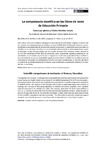Mostrar o rexistro simple do ítem
La competencia científica en los libros de texto de Educación Primaria
| dc.contributor.author | Laya Iglesias, Paula | |
| dc.contributor.author | Martínez-Losada, Cristina | |
| dc.date.accessioned | 2019-06-18T11:06:52Z | |
| dc.date.available | 2019-06-18T11:06:52Z | |
| dc.date.issued | 2019 | |
| dc.identifier.citation | Laya Iglesias, P., & Martinez Losada, C. (2019). La competencia científica en los libros de texto de Educación Primaria. Ápice. Revista De Educación Científica, 3(1), 71-83. https://doi.org/10.17979/arec.2019.3.1.5000 | es_ES |
| dc.identifier.issn | 2531-016X | |
| dc.identifier.uri | http://hdl.handle.net/2183/23243 | |
| dc.description.abstract | [Resumen] Este trabajo tiene como objetivo indagar en qué medida las actividades dirigidas al estudio del ser humano y la salud que proponen los libros de texto LOMCE de 6.º de Educación Primaria, correspondientes a tres editoriales de amplia implantación, promueven la adquisición de la competencia científica de los escolares. El análisis de las actividades (369 en total) se realiza teniendo en cuenta su tipología y el tipo de capacidades que dan ocasión de desarrollar. Respecto a ellas, además de los tres tipos definidos en PISA 2015 se consideran otras capacidades cognitivas presentes en las actividades. Los resultados muestran que la mayoría son cuestiones puntuales de tipo académico, muy centradas en el uso de capacidades ligadas al conocimiento científico en sí, mientras que las directamente asociadas a la competencia científica son poco consideradas. Lo indicado demanda un cambio en los planteamientos de los textos, pues constituyen un elemento clave en la innovación de la enseñanza. | es_ES |
| dc.description.abstract | [Abstract] The objective of this work is investigating to what extent the activities addressed to the study of the human being and health, which are proposed in the LOMCE textbooks of 6º of Primary Education, belonging to three editorials of vast establishment, promote the scientific competence acquisition of schoolchildren. The analysis of the activities (369 in total) is developed taking into account its typology and the type of developing capacities. In relation with these capacities, other cognitive capacities present in the activities are taken into account, apart from the three types defined in PISA 2015. The results show that most of them are one-time academic aspects, highly focused on the use of capacities linked to the scientific knowledge in itself, while the ones associated directly to the scientific competence are less considered. The information previously mentioned urges a change in the textbook approach, since they could be a key element in teaching innovation. | es_ES |
| dc.language.iso | spa | es_ES |
| dc.publisher | Universidade da Coruña | es_ES |
| dc.relation.uri | https://doi.org/10.17979/arec.2019.3.1.5000 | es_ES |
| dc.rights | Atribución-CompartirIgual 4.0 España | es_ES |
| dc.rights.uri | http://creativecommons.org/licenses/by-sa/3.0/es/ | * |
| dc.subject | Libros de texto | es_ES |
| dc.subject | Competencia científica | es_ES |
| dc.subject | Ser humano | es_ES |
| dc.subject | Educación primaria | es_ES |
| dc.subject | Textbooks | es_ES |
| dc.subject | Scientific competence | es_ES |
| dc.subject | Human being | es_ES |
| dc.subject | Primary education | es_ES |
| dc.title | La competencia científica en los libros de texto de Educación Primaria | es_ES |
| dc.title.alternative | Scientific competences in textbooks of Primary Education | es_ES |
| dc.type | info:eu-repo/semantics/article | es_ES |
| dc.rights.access | info:eu-repo/semantics/openAccess | es_ES |
| UDC.journalTitle | Ápice. Revista de Educación Científica | es_ES |
| UDC.volume | 3 | es_ES |
| UDC.issue | 1 | es_ES |
| UDC.startPage | 71 | es_ES |
| UDC.endPage | 83 | es_ES |






